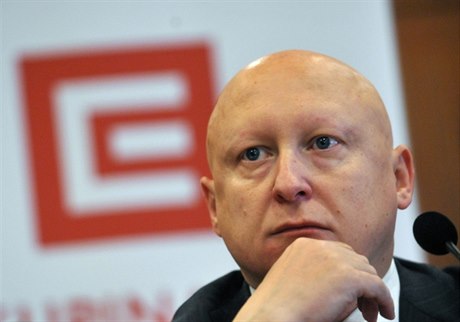The markets have welcomed the Czech antimonopoly office’s approval of state-controlled power utility ČEZ’s planned acquisition of the Energotrans heating plant (the main supplier for Prague) from domestic energy group Energetický a Průmyslový Holding (EPH).
Prague-listed ČEZ had been waiting for approval from the Office for the Protection of Competition (ÚOHS) since last year, as regulators launched a detailed long-term probe into the Energotrans deal, part of a larger asset agreement between ČEZ and EPH, on concerns that it could increase ČEZ’s grip of the electricity production market beyond an acceptable level.
The ÚOHS approval was the last hurdle ČEZ faced in its attempt not only to buy the Energotrans heating plant but to complete the disposal of its half stake in German coal company Mibrag to EPH — whose boss, Daniel Křetínský, established close relations with ČEZ when he was the manager of J&T Banka.
ČEZ and EPH — owned by the PPF Group controlled by Czech billionaire Petr Kellner and J&T (40 percent each) and Křetínský (20 percent) — in February 2009 together bought Mibrag for € 404 million. Its two mines, near Leipzig, produce almost 20 million metric tons of brown coal a year. Mibrag also owns and operates three power plants with a combined output of 208 MW.
“ČEZ paid € 208 million for its 50% stake in early 2009 and took a Kč 2.7 billion writedown for the value of the investment in 3Q11. If the deal closes, there should not be any impact on ČEZ’s reported 2012E earnings,” Bram Buring, an analysts at Prague-based Wood & Company, said in a note to clients on Tuesday.
‘The balance is positive due to the interest from the loan to the mine and the dividends that ČEZ took from the joint venture.’
“At that time, ČEZ calculated the net cash gain from the transaction at € 46 million. The balance is positive due to the interest from the loan to the mine and the dividends that ČEZ took from the joint venture,” he said.
Energotrans, which owns an aging 325 MW coal-fired power plant around 35 kilometers north of Prague and land on which ČEZ wants to build a new gas-fired power plant (suitable for delivering heat to the capital) was part of a deal under which the state-controlled power company sold its Mibrag stake to EPH.
Strategically, the ČEZ Group has said it needs to build up its positions in regulated activities, i.e., distribution and heat generation; moreover, following the German political decision to discontinue their use of nuclear energy, the market there is now all the more risky for ČEZ, a major nuclear energy producer in Central Europe.
Some energy experts had said the Energotrans deal would have put ČEZ on or over the 75 percent ceiling of power production on the Czech market — a percentage usually regarded as the point after which a company has a clear dominant position, which would have compelled the ÚOHS to act to curb the utility’s market influence.
In a separate development this week, EPH, following the withdrawal of mining company Czech Coal (controlled by billionaire Pavel Tykač) from a supply contract, is reportedly considering using coal from its Mibrag mine in Germany keep its Elektrárny Opatovice power station running.
Energotrans as long-term earner
According to the news server aktualne.cz, citing internal documents from ČEZ, the company is selling its 50% stake for € 130 million (Kč 3.3 billion). The reported price includes € 25 million for the equity value of the mine and € 40 million – € 45 million for its Profen project (plans to build a new lignite plant on the mine site) and the balance of the value of ČEZ’s initial loans for the joint venture.
The acquisition of Energotrans (owned by EPH’s Pražská teplárenská) comes with a 20-year contract with the Prague administration to supply heat to households and public buildings. Unlike electricity sold on the open market, which is subject to considerable price fluctuations, the contract contains fixed prices, and thus will guarantee a predictable and reliable income for ČEZ.
According to Czech Position’s information, the state-controlled power major will pay Kč 14.5 billion for Energotrans, minus Kč 2 billion which the company will receive in the form of dividends paid in advance. The Kč 14.5 billion figure, according to Wood & Company’s calculations, would place Energotrans at 6.8x 2010 EV/EBITDA versus CEZ's current 2012E EV/EBITDA of 6.6x (in 2009, it paid 10.6x EV/EBITDA for domestic heating assets).
“From this perspective, the reported sale price seems reasonable, in our opinion. Our forecasts include the consolidation of Energotrans from 2H12 – with annual power sales of c.1.2 TWh (1.7% of ČEZ’s gross production) and heat sales of 9 TJ (60% of the group’s heat production),” Buring said. “In terms of 2012E earnings, the Mibrag transaction, at € 130 million, should have no P&L impact for ČEZ this year, but it should be marginally positive for its cash flow.” ‘It’s also a factor that 10 years ago we were selling a minority stake, whereas now we’re buying the whole company.’
Just over 10 years ago, ČEZ owned a 30-percent stake in Energotrans, which it sold to Pražská teplárenská for around Kč 500,000. Later EPH, which also owns Pražská teplárenská, acquired Energotrans. Thus, on the surface of it, ČEZ appears to now be buying back Energotrans shares for some seven times the price it sold them for.
“Over these years, there have been fundamental changes to Energotrans’ business, obviously also as a result of the changes in the price of heat. The company made a net profit of Kč 1.2 billion in 2010,” ČEZ spokesman Ladislav Kříž told Czech Position last summer in the way of an explanation. “It’s also a factor that 10 years ago we were selling a minority stake, whereas now we’re buying the whole company.”




